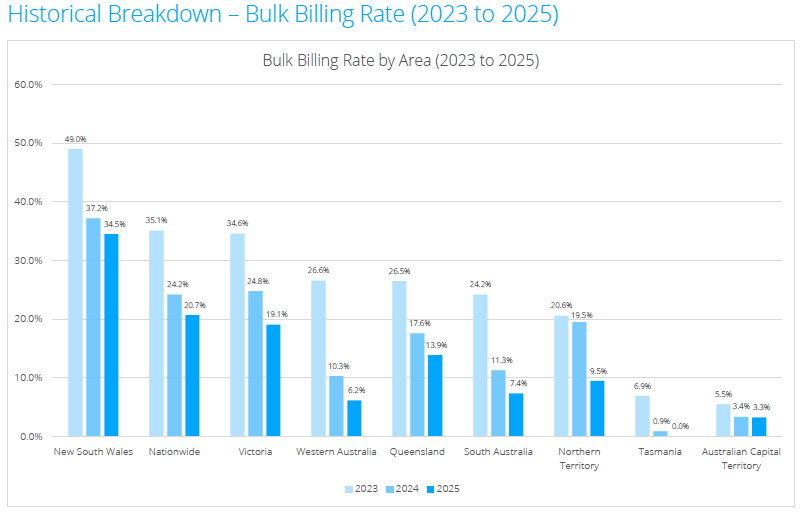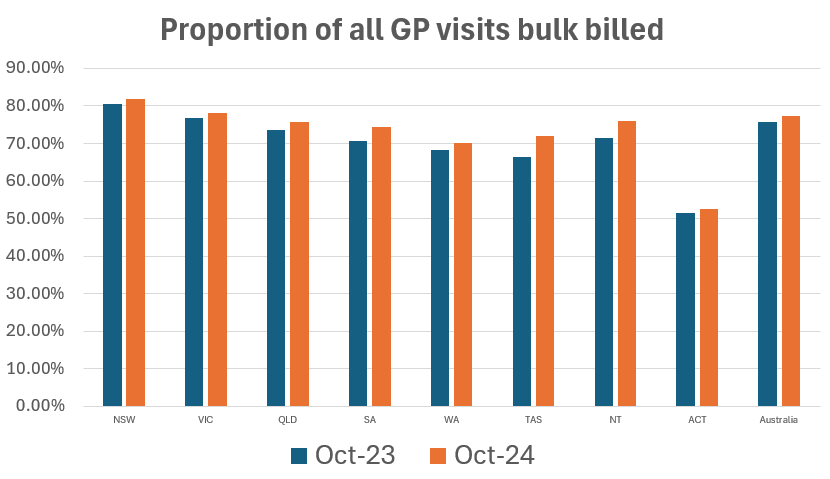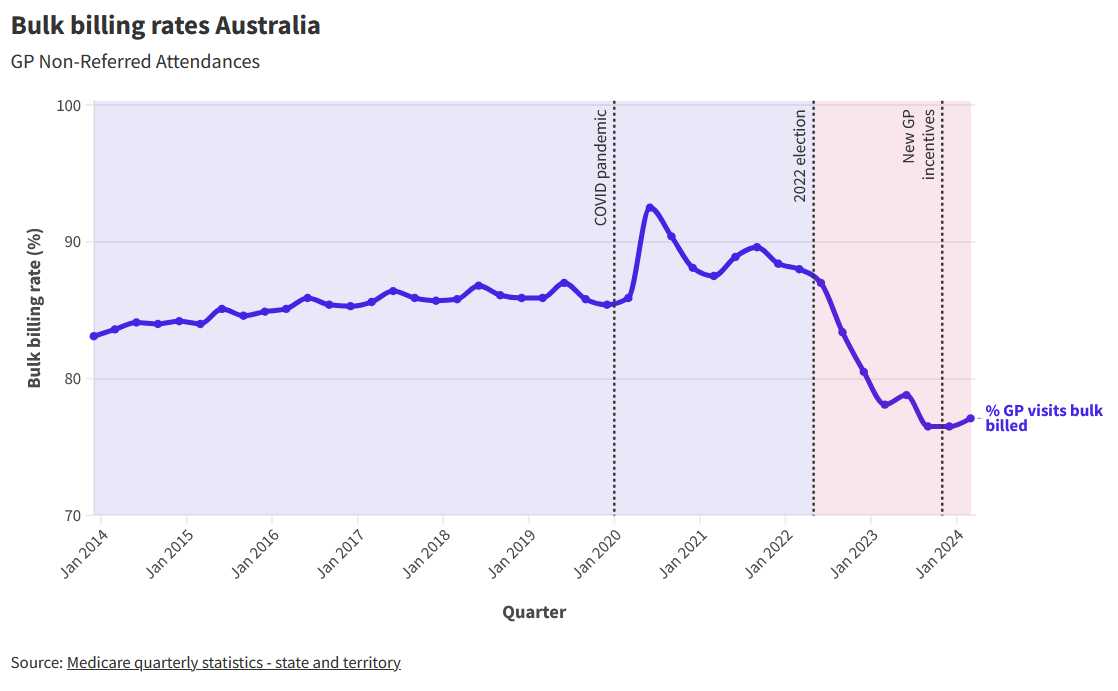
A new report suggests that the number of GP clinics offering bulk-billing to adults without concessions is in sharp decline, but is bulk-billing more broadly on life-support? Zacharias Szumer investigates.
We regret to inform dear readers of MWM that, in order to explain what the hell is going in with bulk-billing in Australia, we’re going to have to get mildly statistical.
Trying to get your head around this stuff can make one feel like piñata being bludgeoned by five baseball-bat wielding statisticians – all of whom have to be pressed to go behind their well-rehearsed lines.
Nonetheless, your correspondent has selflessly dedicated his weekend to taking on the role of this piñata, so let’s get down to it.
Australia’s Cleanbill of health?
Since 2023, a small organisation called Cleanbill has been releasing statistics on the number of GP clinics in Australia that offer to bulk-bill people without concession cards.
This outfit rings up every clinic they find and asks if they’re taking on new patients and how much it will cost.
According to Cleanbill’s latest report, the method attempts to replicate what many adults looking to see a GP without bankrupting themselves do on a regular basis.
“It aims to provide the best understanding of what every GP clinic around you would say if you, as an adult without concessions, asked for their pricing and availability information for a standard consultation during regular, weekday business hours.”
In addition to feeding this info into a public directory for people looking for accurate info about GP clinics in their area (as an aside: why have governments left it up to a tiny organisation to provide this quite useful service?), Cleanbill also puts out an annual report.
So, what do the latest numbers say?
Depends where you live
For one, those in NSW will on average find it a whole lot easier to see a GP with no out-of-pocket costs than someone in Tasmania.
Obviously, there’ll be a lot of variation within an area as large as NSW, and people out in Murrumbidgee – or in one of the nation’s many ‘bulk-billing deserts’ – probably won’t have the options of someone in Parramatta.
In fact, MWM has heard that NSW’s high-rate of bulk-billing GPs is largely attributable to a massive concentration of such clinics in Western Sydney, but don’t quote us on that.
Cleanbill’s data also shows that the proportion of clinics across the nation offering bulk-billing to non-concession holders has declined pretty steadily since 2023.
Because the decision to bulk-bill a patient is at the discretion of a GP, these figures could be somewhat of an overcount – or so we hear from unnameable, top-secret, off-the-record types in government.
Different measurement, different result
As you might have guessed, the Labor government isn’t exactly the biggest fan of the Cleanbill data – or so they will tell you in top-secret, off-the-record comments.
Looking at total visits to a GP – a metric which does include under-16s and concession card holders – their numbers show an increase in bulk-billing over the previous year.
Just over 77 per cent GP visits across the country were bulk-billed in November 2024 – a 1.6 percentage point increase from October 2023, according to a November 2024 press release by Health Minister Mark Butler.
Butler’s call
Butler attributed the rise to their tripling of Medicare incentives for GPs to bulk-bill people with concession cards and under-16s, which came into effect in November 2023.
Essentially this is a payment that GPs get for not charging a concession card holder or a child for a visit; it’s not rebate that applies to general patients.
While the government’s data does include are people with concession cards and under-16s, it doesn’t show the degree to which this uptick is largely just an uptick in these particular cohorts.
However, Grattan Institute health program director Peter Breadon told MWM that it was “likely” that this was the case.
Given the targeted nature of Labor’s incentive-tripling, this wouldn’t be a surprise.
Breadon also suggested Labor shouldn’t focus support solely on these groups.
“I think if they do make an investment to further increase bulk billing, it would be good to look at something broader than something that just targets people on concession cards and children,” Breadon said.
Free-falling facts
In a statement provided to MWM, Mark Butler said the government’s investments in Medicare have “stopped the free-fall in bulk billing that was created under the Liberal and Nationals government”.
Now, that particular choice of wording – “created under”, rather than “occurring under” – may have been intentional, because the Australian Associated Press (AAP) fact-checked one of Butler’s “free-fall” claims earlier in 2024 and found it was misleading.
The figures that the government was crowing about in the 29 April 2024 media release that AAP examined related to the proportion of GP visits that did not involve any patient payments – a bulk-billing measure known as ‘GP non-referred attendances’.
As the following graph shows, there was a net increase in such bulk billing rates during the Coalition’s decade in power.
While bulk-billing rates had started to fall prior to Labor’s 2022 election victory, they continued to drop after Labor took government.
Of course, arresting a trajectory in a system as massive as Medicare isn’t something one would expect a newly elected government to achieve overnight.
Still, the graph above doesn’t show anything an intellectually sound speaker of English would call a “free-fall” happening between 2014 and 2022.
When the AAP asked Butler how exactly bulk-billing was in “free-fall” under the Coalition, one of his spokespeople pointed to “a different measure of bulk billing that was not mentioned in the media release”.
AAP didn’t say what this measure was.
MWM asked the minister’s office about it but didn’t receive a response before deadline.
A ‘Mediscare’ redux?
The record of the Coalition and Peter Dutton on Medicare will become a key plank of Labor’s pitch to voters in the upcoming federal election, according to anonymous party figures backgrounding Nine-Fairfax journos in early January.
During Dutton’s tenure as health minister, the Coalition government attempted to slash Medicare rebates and introduce a mandatory fee for GP visits.
Labor proceeded to weaponise the Coalition’s record on public health to great effect in the 2016 election, running a highly effective campaign that the conservative side of politics planned to privatise Medicare.
There was no publicly available evidence that the Coalition planned to do this, but Labor pushed their opponents onto the back foot and forced then prime minister Malcolm Turnbull into declaring that “Medicare will never, ever, ever be privatised”.
While the conservatives clung on to government, Labor did far better than many predicted and took 14 lower house seats from the Coalition, reducing them to a one-seat majority.
GP payment overhaul on the cards
According to the Labor sources quoted by The Age and Sydney Morning Herald journos, Labor is also considering an overhaul of how GPs are paid under Medicare.
This is something that Breadon agrees with.
“The way we do it now is very crude, where you’re a concession card holder or you’re not, and you get this subsidy for bulk billing those concession cardholders.
“But there’s lots of people who are struggling with out-of-pocket fees who aren’t concession card holders.
“And there’s lots of people that GPs are struggling to see quickly because of the funding model.”
“So, there’s a bigger structural issue here about how we pay GPs.”
Makes pathological sense. Mark Butler ignores lobbyists cries on atomic data
This post was originally published on Michael West.



